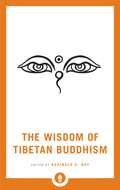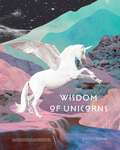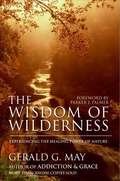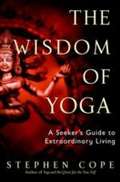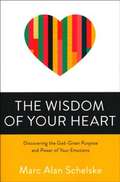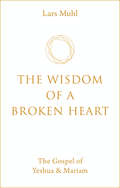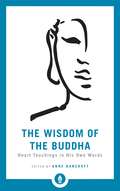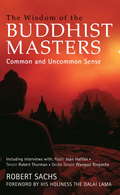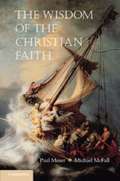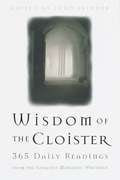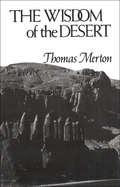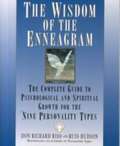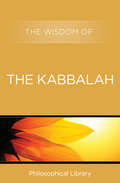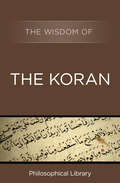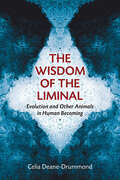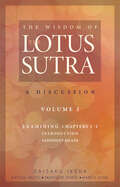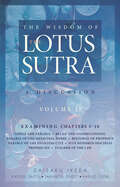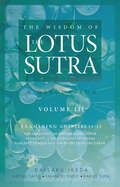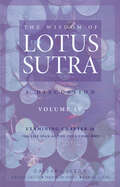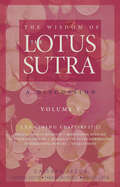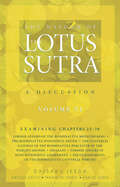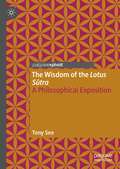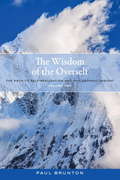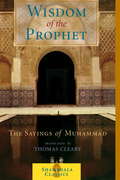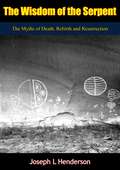- Table View
- List View
The Wisdom of Tibetan Buddhism
by Reginald A. RayAlternately sage and humorous, eloquent and pithy, these inspirational selections illustrate a central affirmation of the Tibetan Buddhist tradition: through the cultivation of self-knowledge, humility, and compassion for others, we can bring about positive and necessary change in ourselves and even in the world around us. Featuring many great masters past and present, including Milarepa, the Dalai Lama, Sogyal Rinpoche, Patrul Rinpoche, Chögyam Trungpa Rinpoche, and others, this compact volume offers wisdom on a variety of topics—bringing a light to the darkness for those seeking guidance.
The Wisdom of Unicorns
by Joules TaylorChannel the magical guidance of unicorns and discover their powers of positivity, spiritual healing, and general awesomeness. This handy, pseudo-spiritual guide is complete with motivating quotes, mantras, and colorful illustrations in the bizarre style of late '80s surrealist pop art.
The Wisdom of Yoga: A Seeker's Guide to Extraordinary Living
by Stephen CopeFor modern spiritual seekers and yoga students alike, here is an irreverent yet profound guide to the most sophisticated teachings of the yoga wisdom tradition--now brought to contemporary life by a celebrated author, psychotherapist, and leading American yoga instructor. While many Westerners still think of yoga as an invigorating series of postures and breathing exercises, these physical practices are only part of a vast and ancient spiritual science. For more than three millennia, yoga sages systematically explored the essential questions of our human existence: What are the root causes of suffering, and how can we achieve freedom and happiness? What would it be like to function at the maximum potential of our minds, bodies, and spirits? What is an optimal human life? Nowhere have their discoveries been more brilliantly distilled than in a short--but famously difficult--treatise called the Yogasutra. This revered text lays out the entire path of inner development in remarkable detail--ranging from practices that build character and mental power to the highest reaches of spiritual realization. Now Stephen Cope unlocks the teachings of the Yogasutra by showing them at work in the lives of a group of friends and fellow yoga students who are confronting the full modern catastrophe of careers, relationships, and dysfunctional family dynamics. Interweaving their daily dilemmas with insights from modern psychology, neuroscience, religion, and philosophy, he shows the astonishing relevance and practicality of this timeless psychology of awakening. Leavened with wit and passion,The Wisdom of Yoga is a superb companion and guide for anyone seeking enhanced creativity, better relationships, and a more ethical and graceful way of living in the world.
The Wisdom of Your Heart: Discovering the God-Given Purpose and Power of Your Emotions
by Marc Alan SchelskeChristians believe many myths about emotions: Emotions lead you astray. Emotions aren’t spiritual. And the biggest myth: God is not emotional. The truth is emotions are a God-given source of wisdom when we know how to interpret them. Marc Alan Schelske explores: How to notice our emotions and hear their truthBrain research that gives unexpected insight into emotions’ purposeWhy denying our emotions hurts couples, families, and even the churchWhy no one can mature spiritually without maturing emotionally The Wisdom of Your Heart provides a path for listening to the spiritual insights that your emotions offer every day.
The Wisdom of a Broken Heart
by Lars MuhlIn this gift book from renowned spiritual teacher Lars Muhl we learn that the vast majority of us will experience emotional pain in our lives but that it's possible to use that pain as a unique opportunity for spiritual growth. The perfect book for improving your self-care or as a gift for someone you love.The Wisdom of a Broken Heart is a beautifully designed hardback gift book with profound content that draws on Lars Muhl's many years of spiritual studies and experiences. In a time when we as humans are being challenged in many ways, Lars stresses that it is through the pain suffered by so many of us, and by understanding the deeper meaning of that pain, that we are given a unique opportunity for a breakthrough at the spiritual plane. Arranged in verse form, the book contains the essence of the secret teachings taught by Yeshua (Jesus) the Nazarene and Mariam (Mary) Magdalene 2,000 years ago. Over the years, the teachings have been revealed in fragments and scattered glimpses; this book now creates a synthesis of the beautiful wisdom of the complete human being. Topics range from the profound energetic exchange that occurs between two lovers (with visualizations to meet Yeshua if you identify as a woman or Mariam if you identify as a man), to using mantras, song and dance in order to reach divine awareness, to numerology and other symbolism. Ultimately, this is a complete guide to living the Law of Light for the benefit of yourself and the wider world. As Lars says: "We are all potential healers, and if there is anything the world needs right now, it is exactly healers."
The Wisdom of the Buddha: Heart Teachings in His Own Words
by Anne BancroftA treasury of teachings, stories, and sayings in the words of the Buddha himself.In their essence, the Buddha’s teachings are concerned with a clear-eyed understanding of the reality of our suffering and pointing the way to freedom from that suffering. Here in all their power, as memorized word-for-word by his disciples and written down a millennium and a half ago, are the core teachings of the Buddha in his own words. These selections deal with the search for truth, the way of contemplation, life and death, living in community, and many other topics, serving as an excellent introduction to the Buddhist path. Clear, uplifting, and potent, the Buddha’s teachings are as freshly relevant today as they were when first presented.This book is part of the Shambhala Pocket Library series. The Shambhala Pocket Library is a collection of short, portable teachings from notable figures across religious traditions and classic texts. The covers in this series are rendered by Colorado artist Robert Spellman. The books in this collection distill the wisdom and heart of the work Shambhala Publications has published over 50 years into a compact format that is collectible, reader-friendly, and applicable to everyday life.
The Wisdom of the Buddhist Masters
by Robert SachsWhat does Buddhism have to say about sickness, poverty, and warfare--or social and political action? Would the wisest, most renowned Buddhist teachers go on the record and reveal their thoughts and perspectives on a wide array of contemporary issues? Robert Sachs decided to find out: he created a questionnaire, brought it to some of the most esteemed Buddhist masters, and interviewed them. Their comments and conclusions are inspirational...and often surprising. Here are the observations of deeply spiritual thinkers on the global problems that confront us today, from the conflict in the Middle East to global warming. These are people who are steeped in meditation, widely traveled, and have seen human misery and warfare with their own eyes. They offer empowering words of wisdom and show us how we can become part of the impetus for change and make a real difference. Most important, these teachers go beyond religious platitudes, and refuse to shy away from politically incorrect conclusions or ideas contrary to the pacifism so often associated with Buddhism. Includes a foreword by His Holiness, The Dalai Lama, taken from his Nobel Peace Prize Speech. The Buddhist Masters interviewed are: H.H. Kunzig Shamar Rinpoche, Ven. Tarthang Tulku Rinpoche, Geshe Tenzin Wangyal Rinpoche, Geshe Michael Roach, Ajahn Amaro, Roshi Joan Halifax, Ven. Thubten Chodron, Christopher Titmuss, Tenzin Robert Thurman.
The Wisdom of the Christian Faith
by Michael Mcfall Paul MoserAlthough typically separated, philosophy and New Testament theology are mutually beneficial for the understanding of the distinctive wisdom that guides Christian thought and life. The Wisdom of the Christian Faith fills a major gap in the literature on the philosophy of religion. It is the first book on the philosophy of religion to be authored entirely by philosophers while directly engaging themes of wisdom in the Christian tradition. The book consists of all new essays, with contributions from John Cottingham, Paul Gooch, Gordon Graham, John Hare, Michael T. McFall, Paul K. Moser, Andrew Pinsent, Robert Roberts, Charles Taliaferro, William Wainwright, Jerry Walls, Sylvia Walsh, Paul Weithman and Merold Westphal.
The Wisdom of the Cloister: 365 Daily Readings from the Greatest Monastic Writings
by John SkinnerA collection of monastic readings are drawn from a full range of writings from the early and contemporary monastics of various orders and from differing denominations, and includes background information on each author.
The Wisdom of the Desert: Sayings From The Desert Fathers Of The Fourth Century (Shambhala Library)
by Thomas MertonThe Wisdom of the Desert was one of Thomas Merton's favorites among his own books--surely because he had hoped to spend his last years as a hermit. The personal tones of the translations, the blend of reverence and humor so characteristic of him, show how deeply Merton identified with the legendary authors of these sayings and parables, the fourth-century Christian Fathers who sought solitude and contemplation in the deserts of the Near East. The hermits of Screte who turned their backs on a corrupt society remarkably like our own had much in common with the Zen masters of China and Japan, and Father Merton made his selection from them with an eye to the kind of impact produced by the Zen mondo.
The Wisdom of the Enneagram: The Complete Guide to Psychological and Spiritual Growth for the Nine Personality Types
by Don Richard Riso Russ HudsonThe Enneagram of personality is a modern synthesis of ancient and modern psychological and spiritual teachings. The contents of this book are the result of the original work of the authors, and no body of Enneagram material has been passed down in a preexisting "oral tradition" in the public domain. Please respect the rights of the authors by not photocopying or otherwise infringing this copyrighted material. This book has been copyrighted and may not be reproduced in whole or in part by any means whatsoever without the expressed written permission of Bantam Books. If you would like to obtain multiple copies of this book at a reduced price, please order them in bulk from the publisher. See page 390 of this book for ordering information.
The Wisdom of the Kabbalah (Wisdom)
by The Wisdom SeriesExplore the third of the great literatures in Judaism While many readers may have heard of Kabbalah in recent years, how many understand the origins and unique perspective of this collection of Jewish mystical beliefs? Handed down in the oral tradition for thousands of years and transcribed in fourteenth-century Spain, the Kabbalah is the classical expression of Jewish mysticism. This collection draws from the main work of Kabbalah—Sepher ha-Zohar, or The Book of Splendor—and offers insight into the great body of Hebrew literature that sprang up and grew parallel to the traditional writings of rabbinical literature. Written in the dialectic style as a commentary to the Torah, the Kabbalah examines man&’s mystical union with God in thoughts of wisdom and deeds of kindness through a symbol-laden examination of the God before creation. A mix of ethics and mysticism, Kabbalah&’s wisdom is frequently imparted through gematria, or a symbolic language based in numbers that correspond with the letters of the Hebrew alphabet. This ebook features a new introduction, image gallery, and index of the Hebrew alphabet.
The Wisdom of the Koran: The Wisdom Of The Torah, The Wisdom Of The Talmud, The Wisdom Of The Koran, The Wisdom Of Muhammad, And The Wisdom Of Buddha (Wisdom)
by The Wisdom SeriesDiscover the beliefs and lessons of Islam&’s sacred textThe Koran, the sacred text at the heart of the second-largest religion in the world, is regarded by Muslims as the exact word of God as revealed to the prophet Muhammad. Representing the ultimate authority on almost every issue related to Muslim life, the Koran&’s lessons and parables offer the faithful moral and spiritual guidance. In The Wisdom of the Koran, readers will discover a selection of key chapters such as &“The Night Journey&” and &“The Cave,&” footnotes to convey context and meaning, as well as several stories from Judeo-Christian history. This invaluable anthology is an excellent step toward greater understanding of one of the finest pieces of Arabic prose and the Muslim faith.
The Wisdom of the Liminal: Evolution and Other Animals in Human Becoming
by Celia Deane-DrummondA sophisticated theological anthropology that takes into account evolutionary theories and our relationships to other animals In this book Celia Deane-Drummond charts a new direction for theological anthropology in light of what is now known about the evolutionary trajectories of humans and other animals. She presents a case for human beings becoming fully themselves through their encounter with God, after the pattern of Christ, but also through their relationships with each other and with other animals. Drawing on classical sources, particularly the work of Thomas Aquinas, Deane-Drummond explores various facets of humans and other animals in terms of reason, freedom, language, and community. In probing and questioning how human distinctiveness has been defined using philosophical tools, she engages with a range of scientific disciplines, including evolutionary biology, biological anthropology, animal behavior, ethology, and cognitive psychology. The result is a novel, deeply nuanced interpretation of what it means to be distinctively human in the image of God.
The Wisdom of the Lotus Sutra, vol. 1: A Discussion (Wisdom of the Lotus Sutra)
by Daisaku IkedaThe Lotus Sutra, Shakyamuni Buddha's highest teaching, explainsthat all people—regardless of gender, social status or education—canuncover the Buddha nature they inherently possess. Based on thisempowering and compassionate sutra, Nichiren Daishonin revealedthe supreme practice for the modern world.Now, in clear, down-to-earth terms, SGI President Ikeda and SokaGakkai Study Department leaders Katsuji Saito, Takanori Endo andHaruo Suda explore the profound meaning of the Lotus Sutra'stwenty -eight chapters. Basing themselves on Nichiren Daishonin's lectureson the Lotus Sutra, The Record of the Orally Transmitted Teachings,they explain the concepts that form the foundation of SGImembers' Buddhist practice. Through their discussions, the ancienttext of the Lotus Sutra comes alive, brimming with profound significanceand practical advice for living in today's world.Volume one covers chapters 1 and 2 of the twenty-eight chapter sutra.
The Wisdom of the Lotus Sutra, vol. 2: A Discussion (Wisdom of the Lotus Sutra)
by Daisaku IkedaThe Lotus Sutra, Shakyamuni Buddha's highest teaching, explainsthat all people—regardless of gender, social status or education—canuncover the Buddha nature they inherently possess. Based on thisempowering and compassionate sutra, Nichiren Daishonin revealedthe supreme practice for the modern world.Now, in clear, down-to-earth terms, SGI President Ikeda and SokaGakkai Study Department leaders Katsuji Saito, Takanori Endo andHaruo Suda explore the profound meaning of the Lotus Sutra'stwenty -eight chapters. Basing themselves on Nichiren Daishonin's lectureson the Lotus Sutra, The Record of the Orally Transmitted Teachings,they explain the concepts that form the foundation of SGImembers' Buddhist practice. Through their discussions, the ancienttext of the Lotus Sutra comes alive, brimming with profound significanceand practical advice for living in today's world.Volume two covers chapter 3-10 of the twenty-chapter Lotus Sutra.
The Wisdom of the Lotus Sutra, vol. 3: A Discussion (Wisdom of the Lotus Sutra)
by Daisaku IkedaThe Lotus Sutra, Shakyamuni Buddha's highest teaching, explainsthat all people—regardless of gender, social status or education—canuncover the Buddha nature they inherently possess. Based on thisempowering and compassionate sutra, Nichiren Daishonin revealedthe supreme practice for the modern world.Now, in clear, down-to-earth terms, SGI President Ikeda and SokaGakkai Study Department leaders Katsuji Saito, Takanori Endo andHaruo Suda explore the profound meaning of the Lotus Sutra'stwenty -eight chapters. Basing themselves on Nichiren Daishonin's lectureson the Lotus Sutra, The Record of the Orally Transmitted Teachings,they explain the concepts that form the foundation of SGImembers' Buddhist practice. Through their discussions, the ancienttext of the Lotus Sutra comes alive, brimming with profound significanceand practical advice for living in today's world.Volume three covers chapter 11-15 of the twenty-eight chapter Lotus Sutra.
The Wisdom of the Lotus Sutra, vol. 4: A Discussion (Wisdom of the Lotus Sutra)
by Daisaku IkedaThe Lotus Sutra, Shakyamuni Buddha's highest teaching, explainsthat all people—regardless of gender, social status or education—canuncover the Buddha nature they inherently possess. Based on thisempowering and compassionate sutra, Nichiren Daishonin revealedthe supreme practice for the modern world.Now, in clear, down-to-earth terms, SGI President Ikeda and SokaGakkai Study Department leaders Katsuji Saito, Takanori Endo andHaruo Suda explore the profound meaning of the Lotus Sutra'stwenty -eight chapters. Basing themselves on Nichiren Daishonin's lectureson the Lotus Sutra, The Record of the Orally Transmitted Teachings,they explain the concepts that form the foundation of SGImembers' Buddhist practice. Through their discussions, the ancienttext of the Lotus Sutra comes alive, brimming with profound significanceand practical advice for living in today's world.Volume four covers chapter 16 of the twenty-eight chapter Lotus Sutra.
The Wisdom of the Lotus Sutra, vol. 5: A Discussion (Wisdom of the Lotus Sutra)
by Daisaku IkedaThe Lotus Sutra, Shakyamuni Buddha's highest teaching, explainsthat all people—regardless of gender, social status or education—canuncover the Buddha nature they inherently possess. Based on thisempowering and compassionate sutra, Nichiren Daishonin revealedthe supreme practice for the modern world.Now, in clear, down-to-earth terms, SGI President Ikeda and SokaGakkai Study Department leaders Katsuji Saito, Takanori Endo andHaruo Suda explore the profound meaning of the Lotus Sutra'stwenty -eight chapters. Basing themselves on Nichiren Daishonin's lectureson the Lotus Sutra, The Record of the Orally Transmitted Teachings,they explain the concepts that form the foundation of SGImembers' Buddhist practice. Through their discussions, the ancienttext of the Lotus Sutra comes alive, brimming with profound significanceand practical advice for living in today's world.Volume five covers chapters 17-22 of the twenty-eight chapter Lotus Sutra.
The Wisdom of the Lotus Sutra, vol. 6: A Discussion (Wisdom of the Lotus Sutra)
by Daisaku IkedaThe Lotus Sutra, Shakyamuni Buddha's highest teaching, explainsthat all people—regardless of gender, social status or education—canuncover the Buddha nature they inherently possess. Based on thisempowering and compassionate sutra, Nichiren Daishonin revealedthe supreme practice for the modern world.Now, in clear, down-to-earth terms, SGI President Ikeda and SokaGakkai Study Department leaders Katsuji Saito, Takanori Endo andHaruo Suda explore the profound meaning of the Lotus Sutra'stwenty -eight chapters. Basing themselves on Nichiren Daishonin's lectureson the Lotus Sutra, The Record of the Orally Transmitted Teachings,they explain the concepts that form the foundation of SGImembers' Buddhist practice. Through their discussions, the ancienttext of the Lotus Sutra comes alive, brimming with profound significanceand practical advice for living in today's world.Volume six covers chapters 23-28 of the twenty-eight chapter Lotus Sutra.
The Wisdom of the Lotus Sutra: A Philosophical Exposition
by Tony SeeThe Lotus Sūtra is one of the most important sūtras in Mahāyāna Buddhism. Translated by Kumārajīva in the 5th century, its teachings have inspired many Buddhist scholars such as Chih-i and Saichō from the Tiantai (Tendai) tradition, Dōgen from the Zen tradition and Nichiren the 13th century Kamakura founder and reformer. There is a relative lack of scholarly works that are devoted to an examination of how its philosophical ideas were received and developed throughout history. This book remedies that lack by tracing the origin and development of Lotus Sūtra thought, and interprets the text from the perspective of the doctrine of Buddha-nature in Mahāyāna Buddhism.
The Wisdom of the Overself
by Paul BruntonInspired by Paul Brunton's years spent with sages in Asia, The Wisdom of the Overself and its companion volume The Hidden Teaching Beyond Yoga were written at the request of these remarkable teachers, who recognized that Brunton had a significant role to play in the transmission of traditional wisdom to the West. Here is a profound re-creation of these teachings, brought to life and made accessible by Brunton's insights. In print since the 1940s, Brunton's works are considered to be among the most comprehensive, clear, and practical guides on the path to enlightenment. Brunton unfolds the grand vision for human development by investigating consciousness as the source of all experience; how to move from ego-centered life to the transcendent reality; the interplay of karma, free will, and grace; the nature of evil and suffering; how to awaken intuition and penetrative insight; the passage through death to rebirth; and psychic experiences and mystic visions. He also provides seven ultramystic exercises to open the door to higher consciousness, including a healing meditation on the sun; practices for transforming the future, dream, and sleep; and a meditation on the timeless self. These techniques lead to the deepest spiritual realizations--to the true "Wisdom of the Overself."This new edition has been updated to incorporate Brunton's final revisions. It includes a new foreword plus supplementary reading material selected from the author's archives by the Paul Brunton Philosophic Foundation.ContentsForeword by the Paul Brunton Philosophic Foundation 1. Prefatory 2. The Meaning of Mentalism 3. The Birth of the Universe4. Studies in Dreams5. The Metaphysics of Sleep6. The Secret of the "I"7. The Scorpion of Death8. The Immortal Overself 9. The Shadows of Evil and Suffering10. The War and the World11. The World-Mind12. The Unveiling of Reality 13. Initiation into Mystical Experience 14. The Yoga of the Discerning Mind 15. The Mystical Phenomena of Meditation 16. Some Fruits of PhilosophyAppendix: Additional Resources from The Notebooks of Paul Brunton, Compiled by the Paul Brunton Philosophic Foundation EditorsFrom the Trade Paperback edition.
The Wisdom of the Prophet: The Sayings of Muhammad
by Thomas ClearyThe Wisdom of the Prophet contains a rich selection of hadith, or traditional teaching stories based on the words and deeds of Muhammad, that have brought inspiration and guidance to spiritual seekers for centuries. The passages in this collection, chosen for their universal appeal, reveal both Muhammad's profound worldly wisdom and his lofty spiritual vision. The Wisdom of the Prophet contains more than two hundred authentic stories and sayings of Muhammad translated by Thomas Cleary, the translator of The Essential Koran.
The Wisdom of the Serpent: The Myths of Death, Rebirth and Resurrection
by Joseph L Henderson Maud OakesSHAMAN AND SERPENTIn the tradition of Jungian analysis, a psychiatrist and an anthropologist explore the meanings and manifestations of death through ritual, religion and myth.The knowledge that he must die is the force that drives man to create. The tribal initiation of the shaman, the archetype of the serpent, exists universally in man’s experience, exemplifying the death of the Self and a rebirth into a transcendent, “unknowable” life.In The Wisdom of the Serpent: The Myths of Death, Rebirth and Resurrection, first published in 1963, the authors trace the images and patterns of psychic liberation through personal encounter, the cycles of nature, spiritual teaching religious texts, myths of resurrection, poems and epics. They translate these elements of common human experience into a them for modern man: the reinterpretation of the individual freed from the mortal boundaries of the Self.First published in 1963, this classic work in analytical psychology includes notes on the illustrations, appendix and references.
